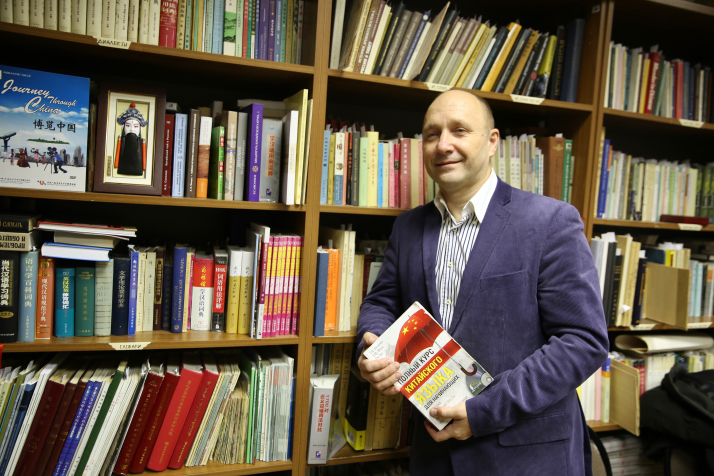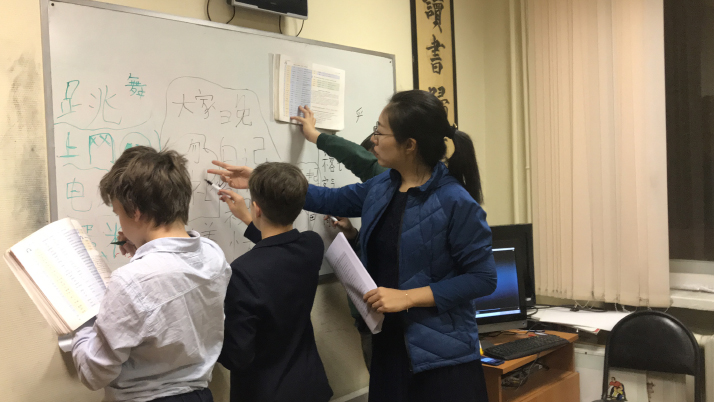| Lifestyle |
| Teaching in Russia | |
| A Confucius Institute popularizes the Chinese language and culture in Moscow | |
|
|
|
Students attend a Chinese language class at the Confucius Institute at the RSUH in Moscow on November 25 (WANG HAIRONG)
Even though in Moscow dusk falls early in winter, instead of snuggling up in her cozy home after school, Arina Buntova is making her way to the Russian State University for the Humanities (RSUH) for her Chinese language class. The 14-year-old has been studying Chinese at the Confucius Institute at the RSUH for a year and a half. "I'm interested in the Chinese language because I want to travel to China," she told Beijing Review. On November 25, three classes for children were already in session at the institute, while throngs of adults were just arriving for their after-work classes. Language teaching Launched in 2006, the Confucius Institute at the RSUH is the first official Chinese teaching center in Moscow and the second in Russia. "The number of Chinese language students in Russia is increasing year by year, and their enthusiasm is also growing," Aleksandr Bezborodov, the university's president, said. "Meanwhile, many Chinese students have come to study at the RSUH and several Chinese officials have visited the university." The two peoples' interest in each other's cultures provides an important opportunity for the development of the institute, he added. Taras Ivchenko, Dean of the Confucius Institute at the RSUH, said over 10 years ago, the university realized that there was a need to provide courses for those who wanted to study Chinese. On learning of the Confucius Institute program launched in 2004 by Hanban, a non-profit institution in China committed to providing Chinese language and cultural teaching resources and services worldwide, the RSUH submitted an application to Hanban and set up its Confucius Institute in partnership with the Beijing-based University of International Business and Economics (UIBE).  Taras Ivchenko, Dean of the Confucius Institute at the RSUH, on November 25 (XU HAO)
In 2007, the institute offered two classes with about 40 students, while in 2019, it provided classes to more than 500 students through 18 classes during the spring semester and 21 in the fall, Ivchenko said.
The institute has over 20 instructors, most of whom are Russians who speak fluent Chinese. There are also two guest teachers along with some teaching assistants from China. Chinese language learners in Russia have much better access to teaching resources compared to decades ago, Ivchenko said, citing his own experience as both a learner and an educator. Ivchenko's first contact with the Chinese language was when he was a student majoring in applied linguistics at the Moscow State University (MSU) in the 1980s. One summer holiday, he went to Kyrgyzstan, then a republic of the Soviet Union, to study the language of the Dungan people, who are descendants of Hui ethnic Chinese immigrants to Central Asia more than a century ago. Some Dungan people still speak a dialect from China, so Ivchenko learned a little of it. After graduation, he worked on machine translation at an institute of information technology and gradually felt the need to have Chinese language proficiency. At that time, Chinese was taught only to students majoring in the language at three universities in Russia and there were few textbooks on the subject. After work, Ivchenko learnt Chinese from Zhao Shuhua, a guest teacher at the MSU from Beijing Language and Culture University. After studying Chinese for three and a half years, he quit his research job and became a Chinese language instructor at the Institute of Asian and African Studies (IAAS) at the MSU. From 1995 to 1999, he studied at Peking University and earned a doctorate in the history of the Chinese language. In 2004, Ivchenko left the IAAS and became one of the founding faculty members of the Confucius Institute at the RSUH. Over the past 12 years, in addition to teaching, Ivchenko has also compiled several Chinese language textbooks, one of which was reprinted three times in one year, selling over 6,000 copies. These textbooks are displayed on the bookshelves in his office, along with many books on China that he has collected over the years. Today, anyone who wants to learn Chinese can enroll in the Confucius Institute at the RSUH. The institute also promotes quality language teaching by hosting seminars and conducting research. In October, it hosted an international seminar on the study of China and the Chinese language in Russia, which drew about 100 participants. This year, it has organized eight roundtables on Chinese classic literature.  Students practice writing Chinese during a class at the Confucius Institute at the Russian State University for the Humanities (RSUH) on November 25 (XU HAO)
A cultural center In addition to teaching Chinese, the Confucius Institute at the RSUH also offers a variety of courses on Chinese culture such as tea ceremony, calligraphy and painting, said Zhang Rui, a professor from the UIBE who serves as co-dean of the institute. Since this year marks the 70th anniversary of the establishment of diplomatic ties between China and Russia, a lot of celebratory activities have been held. In the first 11 months of the year, the institute sponsored 102 cultural events, with the number of participants more than tripling from last year to reach 8,300, according to Zhang. In January, it received middle school students from Guangdong Province in south China who came to Moscow for a winter camp. In July, 30 students from the institute went to China for a summer camp, staying in Beijing for a week to learn the Chinese language and culture and then traveling to the southwestern province of Yunnan to experience the cultures and customs of local ethnic groups. In February, the institute hosted a Chinese New Year gala for Russian nationals who once studied in China. The event drew approximately 200 graduates of nearly 40 Chinese universities, who shared their stories. The institute invited the Tianjin Youth Peking Opera Troupe to perform during the China Festival in Moscow in September, which featured Peking Opera, Chinese classical music and other cultural shows. "People-to-people exchanges are very important, so we make every effort to promote such programs," Bezborodov said. Russian people, amazed by China's economic development and interested in its culture, have a friendly feeling toward China, he said, adding that one of the RSUH's missions is to pass this warm sentiment down to younger generations. (Reporting from Moscow, Russia) Copyedited by Rebecca Toledo Comments to wanghairong@bjreview.com |
|
||||||||||||||||||||||||||||||
|
